
It is always sad and pitiful and humiliating when we fail to recognize that the old and the new belong to each other, and that neither is complete without the other. It is the peculiar temptation of youth to treat the traditions of the past with impatience. And it is the special frailty of old people that they look with suspicion upon everything new. Youth always has its face to the future and worships the new. Age always has its face to the past and treasures the old.
Now about all this Jesus once said a very striking thing, which I blush to confess that I never understood until yesterday. ‘Every scribe,’ He said, ‘who is instructed unto the kingdom of heaven is like unto a man that is an householder, which bringeth forth out of his treasure things new and old.’ Things new and old, mark you! Not a jumble of new things and old things all mixed up together, like new wine in old bottles. But things that are, at one and the same time, both new and old. For no really good thing is either old or new. It is both. Bring me the most antique object you can find, and I will show you how startlingly new it it is! Bring me the most newfangled idea that has come to light, and I will astonish you by revealing its hoary antiquity.
The Uttermost Star, ‘When the Tide Turns’, p. 267-268, 1919
“An audience does not applaud when it is thinking hard, and certainly it does not applaud when it is conscience-stricken.”
F.W. Boreham, ‘A Tuft of Comet’s Hair’, “Applause”, 1926, p. 95






“A man makes more noise in clearing snow off his front path than the sun makes in melting a million tons of it. God is so wonderfully silent because He is so wonderfully active.”
F.W. Boreham – THE WHISPER OF GOD, pg 18, 1902
“God stands in relation to His world as the Author stands in relation to his manuscript. He may need to introduce a villain, but He Himself is not on the side of the villain. The world is not out of control. Everything in it – material and spiritual – is, like the unfinished story on Stevenson’s desk, at the command of its divine Author. And the Author is on the side of the good!”
-F.W. Boreham, ‘Hello, Old Chap!’, A WITCH’S BREWING, p. 231-232, 1932
“And just as each steel filing, drawn to a powerful magnet, is united, not only to the magnet, but to every other filing that has capitulated to the same irresistible attraction, so every man who has fallen under the spell of the Cross is bound to every similar penitent by ties that can never be broken.”
Dr. F.W. Boreham, ‘A Letter of Introduction’, THE IVORY SPIRES, 1934, page 33


FWB on The Glory of Easter
FWB on The Glory of Easter
It is the distinctive glory of Easter that it imports into the programme of the year the soul-stirring note of challenge and of triumph. In deploring the cheerless and disconsolate atmosphere that enveloped the funeral of Robert Browning, Sir Edward Burne-Jones said that he longed to see, somewhere in the black procession, one or two gay, defiant banners, “and much would I have given,” he adds, “if a chorister had emerged from the triforium and rent the air with a trumpet!” Easter supplies that exultant quantity. For, at Easter time, we do honour, not to one of life’s phases or events or experiences, but to life itself. Easter stands for life at its best, regnant, deathless, immortal. And, in consequence, it produces its stimulating reaction in us all.
Among the subtle but authoritative laws that govern our intricate and complex beings is a law that ordains that the life that pulses within our own veins shall throb with new and startling energy whenever it is confronted by some vivid manifestation of life around or life beyond. The repercussion is so perfectly natural and instantaneous that we often ascribe to external and objective causes a sensation that is really internal and subjective. Wordsworth was once asked why he wrote, and wrote at considerable length, of dancing daffodils.
I saw a crowd,
A host of golden daffodils
Beside the lake, beneath the
trees,
Fluttering and dancing in the breeze.
And—
Ten thousand saw I at
a glance
Tossing their heads in sprightly dance,
The waves beside them
danced, but they
Outdid the sparkling waves . . .
But, as the poet was obliged to confess when his attention was directed to the matter, daffodils do not dance. They stand perfectly still. Confronted by this embarrassing problem, Wordsworth reflected for some time and then replied that he could only suppose that, since the daffodils set his soul dancing with delight, he had unconsciously transferred the inward sensation to the outward object.
Humanity’s Invincible Lust Of Life
The thrill with which we greet the return of Easter is but another phase of the same arresting phenomenon. It is life answering to life. In actual fact, man loves life, profoundly and constantly, and every manifestation of the thing that is so dear to him captivates his fancy and sends tremors of gladness through all his being. We love the city because it swarms with life; we love the bush because new forms of life startle us everywhere; we love the play, the film, the novel and the art gallery because, by means of them, we are able to explore new twists and turns of the life that we love. A similar discovery, on a still more exalted and impressive plane, breaks upon our minds with every recurring Easter. Easter is the supreme festival of life, of resurrection, of immortality. Our nerves tingle in response to its stirring message. In celebrating Easter we are unconsciously giving three cheers for life itself.
It is only man’s unquenchable lust of life that enables him to live. In his “Kingdom of Man,” Sir Edwin Ray Lankester directs attention to the remarkable fact that although, compared with the brutes, man is one of the most helpless and one of of the most fertile creatures on the planet; he is at the same time one of the most doggedly persistent and one of the most prolific. His birth rate is inconsiderable when compared with the birth rate of the beasts. What then is the secret of his survival and multiplication? Sir Edwin attributes it to his low death rate. His love of life leads him to cling with amazing tenacity to the life that he cherishes. His intense and passionate love of living enables him to endure when all things band together for his destruction. “Even when every natural chance is against him, he insists on saying, and on saying successfully: ‘I will live!'” This irrepressible love of life is his most significant and important characteristic.
Man Dares The Thing He Most Dreads
Man is a medley of contradictory qualities. He involves himself in risks that no other creature would face; yet he insures himself, in a way that is possible only to himself, against the hazards that he courts with such intrepidity. Thus, for example, he is the only creature that absolutely declines to be restricted in the scope of his operations by climatic conditions. Other animals have their own geographical haunts and natural habitats. But man goes everywhere. Neither polar snows nor equatorial suns deter him in his restless wanderings and his alien settlements. Yet, although he displays an audacity that no other creature can rival, and scorns all the limits set, by torrid and by frigid zones, his rate of mortality is the lowest on record. He seems at times to be courting death and destruction; but it is merely a piece of innocent coquetry; he is genuinely in love with life and will ensure any torture in order to retain it.
Nourished by such hopes and aspirations as Easter annually brings, man’s passion for living waxes as his physical faculties wane. Men come to feel that death, in any ultimate sense, is unimaginable. The instinct of immensity, infinity, eternity is the light of their eyes and the breath of their nostrils. Immortality is in their blood. In dying, they defy death with the sublime taunt that, though dying, they can never die. They go down to their graves but they go down to their graves with a triumphant Nil Desperandum on their lips. They cry, with Browning:
If I stoop
Into a dark tremendous sea of cloud,
It is but for a time: I
press God’s lamp
Close to my breast: its splendour, soon or late,
Will
pierce the gloom: I shall emerge one day;
You understand me? I have said
enough.
It is the peculiar glory of the Easter festival that, once a year, it sounds in the responsive hearts of men that stimulating trumpet blast of unconquerability.
F. W. Boreham
F. W. Boreham once lost patience with a difficult man
F. W. Boreham once lost patience with a difficult man named Crittingden, who had spoken many critical words…
Boreham wrote a flaming letter designed to rebuke the complainer. He walked to the mailbox to post the letter. Since it was a lovely night for a walk, he passed the mailbox without dropping the letter in, thinking he’d mail it on the way back. Further on he met a friend who said, “Poor old Crittingden is dead.”
Boreham was shocked. “Is he, indeed? When did this happen?”
“Oh, he died suddenly early this afternoon. It’s really for the best, you know. He’s had a hard time. You know all about it, I suppose?”
“No, I don’t.”
“Oh, I thought everybody knew. He only had two children, a son and a daughter. The son was killed soon after his wife dies, and the daughter lost her mind and is in the asylum. Poor old Crittingden never got over it. It soured him.”
Boreham returned to his fireside that night, jumbled and ashamed. He tore the letter into small fragments and burned them one by one. And as he knelt before the blaze, he prayed that, in days to come, he might find grace to deal gently and lovingly with difficult people.
Boreham On Befriending One's Fears
Boreham On Befriending One’s Fears
I wish I could do for Cecil what a very eminent physician recently did for a young patient to whom he was called. It is Dr. H. E. Fosdick who tells the story. The boy’s nerves were being frayed and lacerated by a terrible dream that came to him, night after night, with pitiless regularity. As soon as he dropped off to sleep he found himself confronted by a frightful tiger. At their wits’ ends, his parents called in a specialist in child psychology. After thinking it over, the great man took the child on his knee.
‘See here, sonnie,’ he said, ‘they tell me that every night you meet a tiger. Now, really, he is a nice, kind, friendly tiger, and he wants you to like him, so, the next time you meet him, just put out your hand and say, “Hello, old chap!” and you will find that he will chum up to you and become a pet!’
That night, after a period of pleasant repose, the boy manifested all the symptoms of his former terror. He tossed about, ground his teeth, puckered his face, and broke into a violent perspiration. Then, all at once, we are told, his muscles relaxed. ‘He thrust a small hand out from under the bed-clothes and murmuring softly: ‘Hello, old chap!” his frightened breathing quietened into the perfect restfulness of natural sleep.’
He had discovered that the tiger, however terrible in aspect, was not necessarily hostile, after all!
F. W. Boreham, A Witch’s Brewing (London, Epworth Press, 1932, p. 229)
F. W. Boreham and that Benediction
F. W. Boreham and that Benediction
I cherish amongst my richest treasure-trove the memory of my first visit to Granny. She had been recently widowed. Her sons and her grandsons farmed the fertile hill-sides all around her. And they had built for her special comfort a dainty little cottage at the back of the old homestead. The picture is indelible. There she stands in the rose-covered doorway of the quaint little cabin, like a pretty old painting, exquisitely framed! I can still see her wrinkled face buried in the wavy depths of her lilac sun-bonnet. Her little plaid shawl is neatly crossed over her breast and fastened behind her back. Her Scottish accent was so pronounced and her brogue so broad that I cannot pretend to have caught every word that she uttered; but for all that it was a treat to hear her. There is music in the murmur of the waves, though we know not what they are saying. And at any rate, if poor Granny’s speech was too subtle for prosaic southern ears, her eyes were always eloquent enough. They seemed to glow with the very joy of living; and as she stands there, framed in her cottage portal, her hands seem always outstretched to welcome her minister. I wish that every man could share my rare privilege in passing straight from college to such a school as Granny kept for me ! When, nowadays, I find sleep coy and difficult to woo, I just lie still and think of Granny as I used to see her at her cabin-door in those first days of my ministry in Maoriland.
What times they were! What tales she told me as we sat together in her wee but cosy ‘but and ben’! The pathos of her early exile; her insufferable home-sickness as she sat, on quiet and lonely Sabbaths, her face in her hands and her elbows on her knees, peering over the wilds and the waters, dreaming fondly of the auld land and the auld kirk. How tenderly she told of the patient struggles of those first days of colonization: the infinite labour of building their home on the summit; the long and perilous tramps in search of every simplest requisite; the heavy burdens that had to be carried on their own backs in the days before horses and cattle were to be had; the prosperity that responded to toil; and the case that came with the years! Of all these she chatted easily, cheerfully, gratefully.
And when, after awhile, I saw her tall young grandson pass the open door on his way to the stable to harness the horses to my sledge, I used to reach for her old Bible. It had accompanied her through all the days of her pilgrimage. The covers had been more than once repaired. Every page was brown with age and wear. How fondly she eyed it as I opened its mellow leaves! I read to her passages that were like music to her soul. She always chose them, and her face simply gleamed as I read. She had learned every word of those stately chapters by heart before I was born, and, had I stumbled, would have instantly detected the slip; but she enjoyed the passage none the less on that account. And then we kneeled together in the Presence that was very real; and somehow I always felt that prayer was wonderfully easy in the perfumed atmosphere of that little room.
I heard one day that Granny was dying! It was raining in torrents! There was no way of arranging for the mountain-sledge. I drove to the foot of the track, and then commenced the ascent. It was the only time that I ever walked it. And I even felt glad that it was raining. It would have seemed a horrid incongruity if the sun had been shining and the birds singing when old Granny was dying!
To my joy, I arrived in time! Granny was lying dreadfully still and perfectly prostrate in her tiny room. The watchers thoughtfully slipped out and left us, as we had so often been, alone together. I stroked the wrinkled brow about which the snowy curls were tumbled now. Her eyes spoke to me in reply, and I understood. For the last time I reached for her Bible. I knew what to read. If for her great countryman there was ‘only one Book’ at such a time, for Granny there was only one chapter. ‘In my Father’s house are many mansions.’ Even as I gave utterance to the beautiful and rhythmic cadences, the rain ceased to beat upon the little window-pane, and I read on amidst a silence that was like the threshold of another world. It was like the hush of the Presence-chamber, the anteroom of the Eternal. I could see that Granny drank in every syllable, and it was as the wine of the kingdom of heaven to her taste. And then I prayed—or tried to—for the last time! When I rose from my knees by her bedside, the setting sun had struggled through the rain-clouds. It streamed gloriously through her little western window. It transfigured her wan face and wandering hair as it fell upon her snowy pillow. I quietly rose to leave. I was about to take her hand in mine when a thing happened that I think I shall remember when all things else have been forgotten.
To my amazement, Granny rose, and sat bolt upright! In the glory of the setting sun, she seemed almost more than human. ‘Doon!’ she exclaimed, ‘doon!’ and motioned me to kneel once more by her bedside. I obeyed her. And, as I knelt, I felt her thin, worn hands on my head, and I heard her clear Scotch accent once more. ‘The Lord bless ye,’ she said in slow and solemn tones; ‘the Lord bless ye and keep ye! The Lord bless ye in your youth and in your auld age! The Lord bless ye in your basket and in your store! The Lord bless ye in your kirk and in your hame! The Lord bless ye in your guid wife and in your wee bairns! The Lord bless ye in your gaeings out and in your comings in frae this time forth and even for evermair!’ I have bowed my head to many benedictions, but I have never known another like that. The frail form was completely exhausted, and poor Granny sank back heavily upon her pillow. In a very little while she had passed beyond the reach of my poor ministries. But I often feel her thin fingers in my hair; and that last benediction will abide, like the breath of heaven, upon my spirit till I shall see her radiant face once more.
F W Boreham ‘Granny’ Mountains in the Mist (London: Charles H Kelly, 1914), 205-210
Learn more about the life, ministry and work of Dr. F.W. Boreham
[continue]
Dr. F.W. Boreham wrote over 55 books. In their original editions, each of these are now collector’s items.
View the entire list of Dr. F. W. Boreham books here.
FWB Quotes
Find a pithy FWB quote for your Twitter feed.
[view]
Shop for FWB Books and Videos
Shop for FWB resources [view]



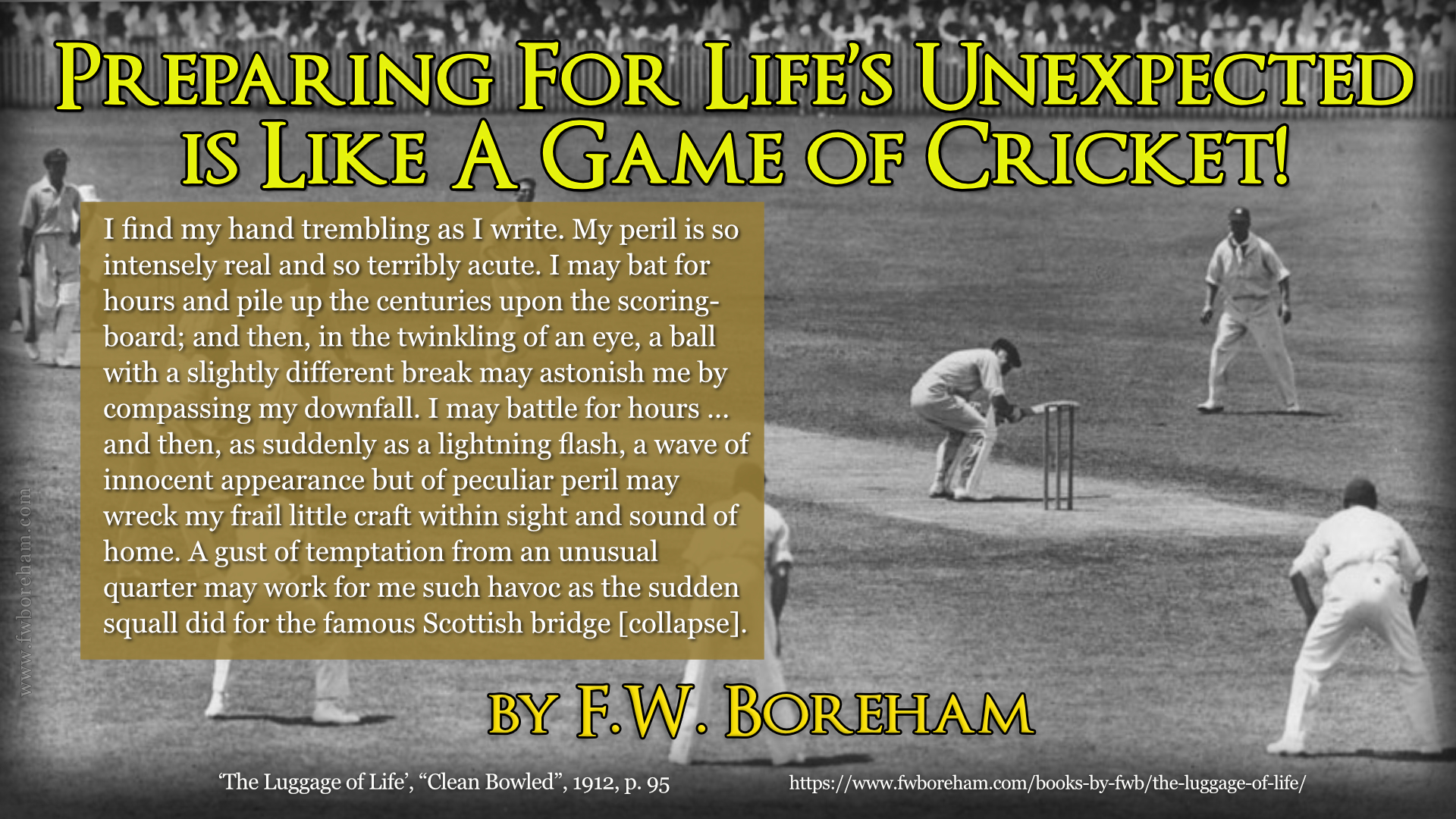
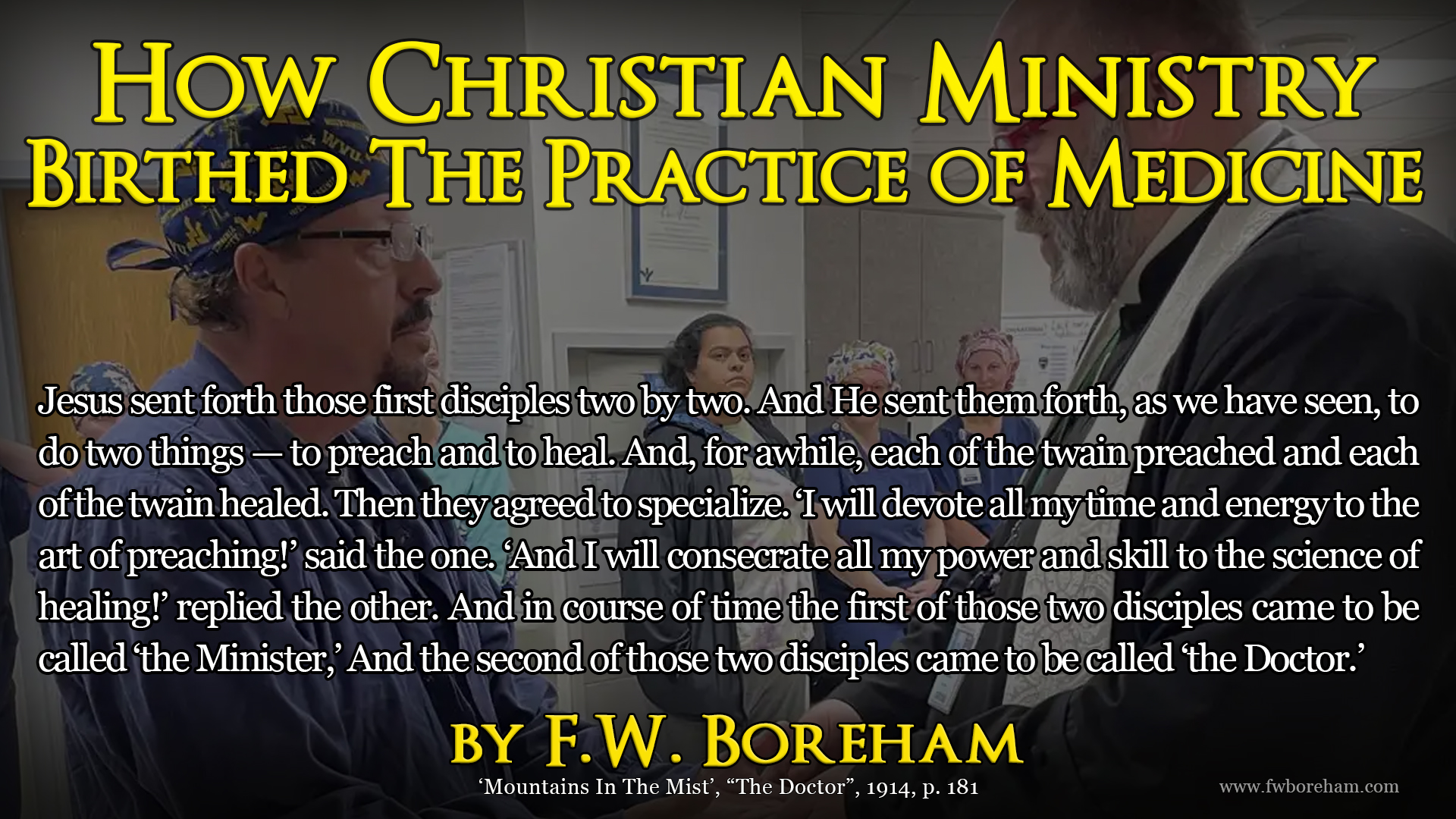

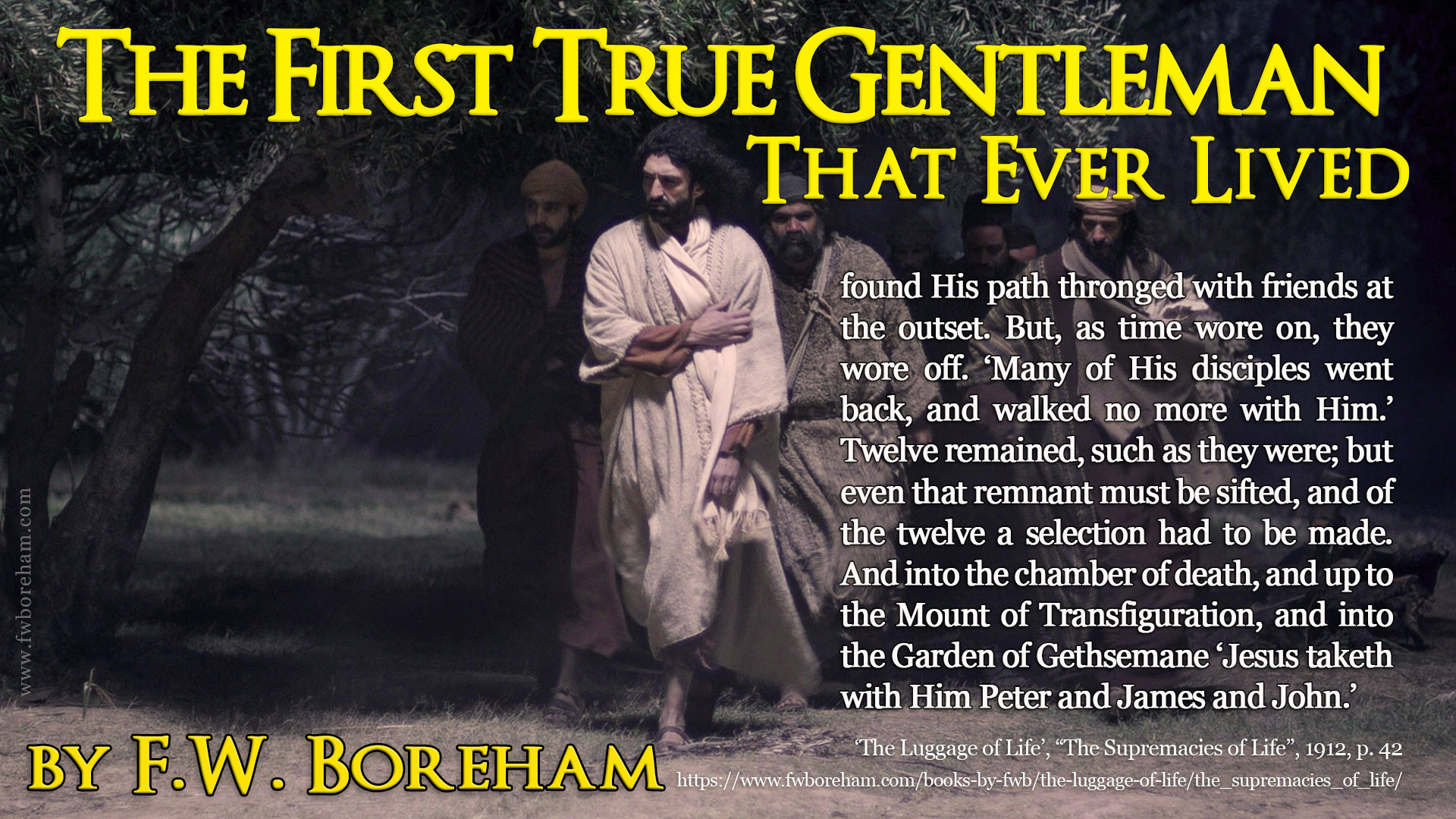





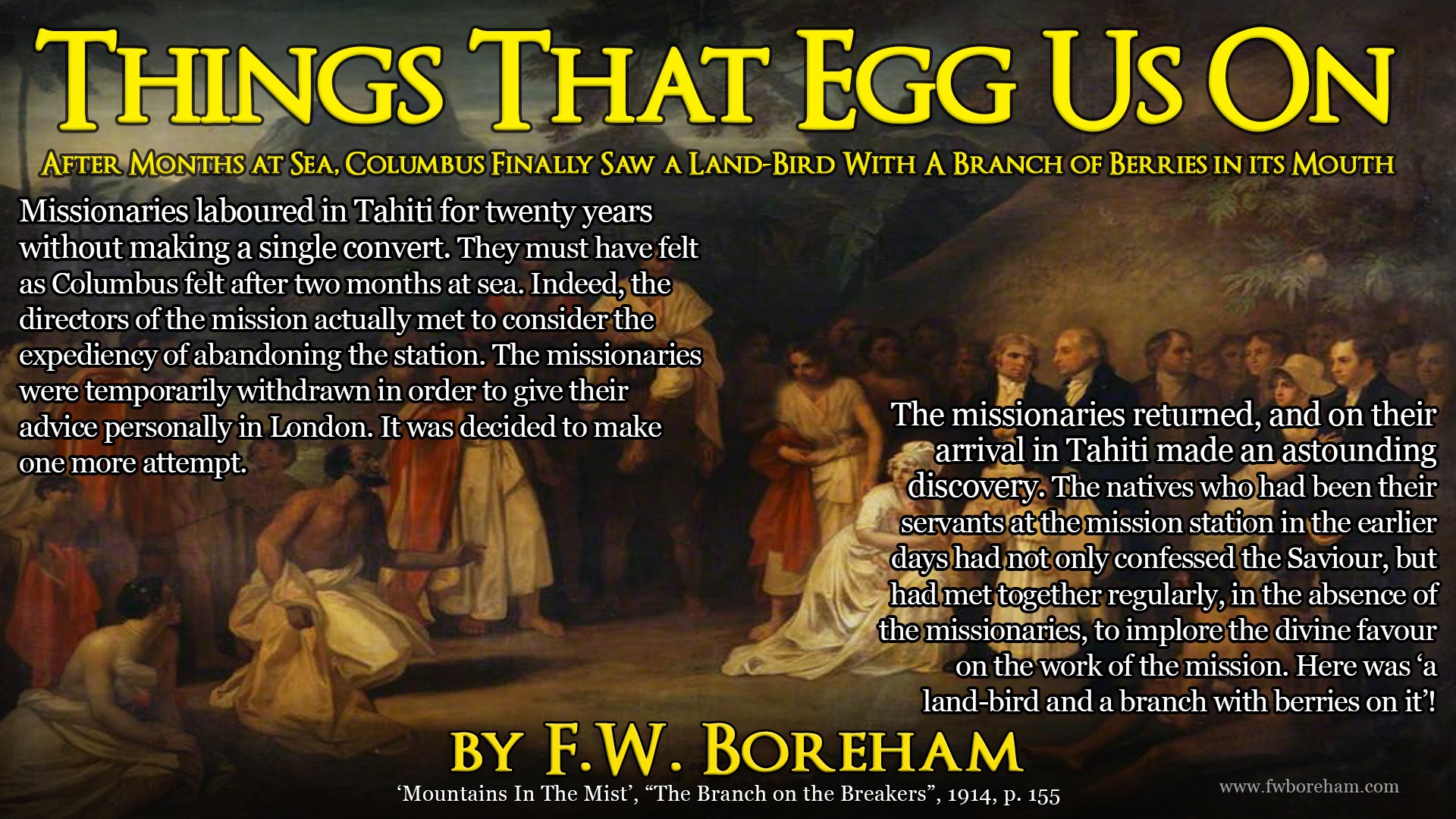





















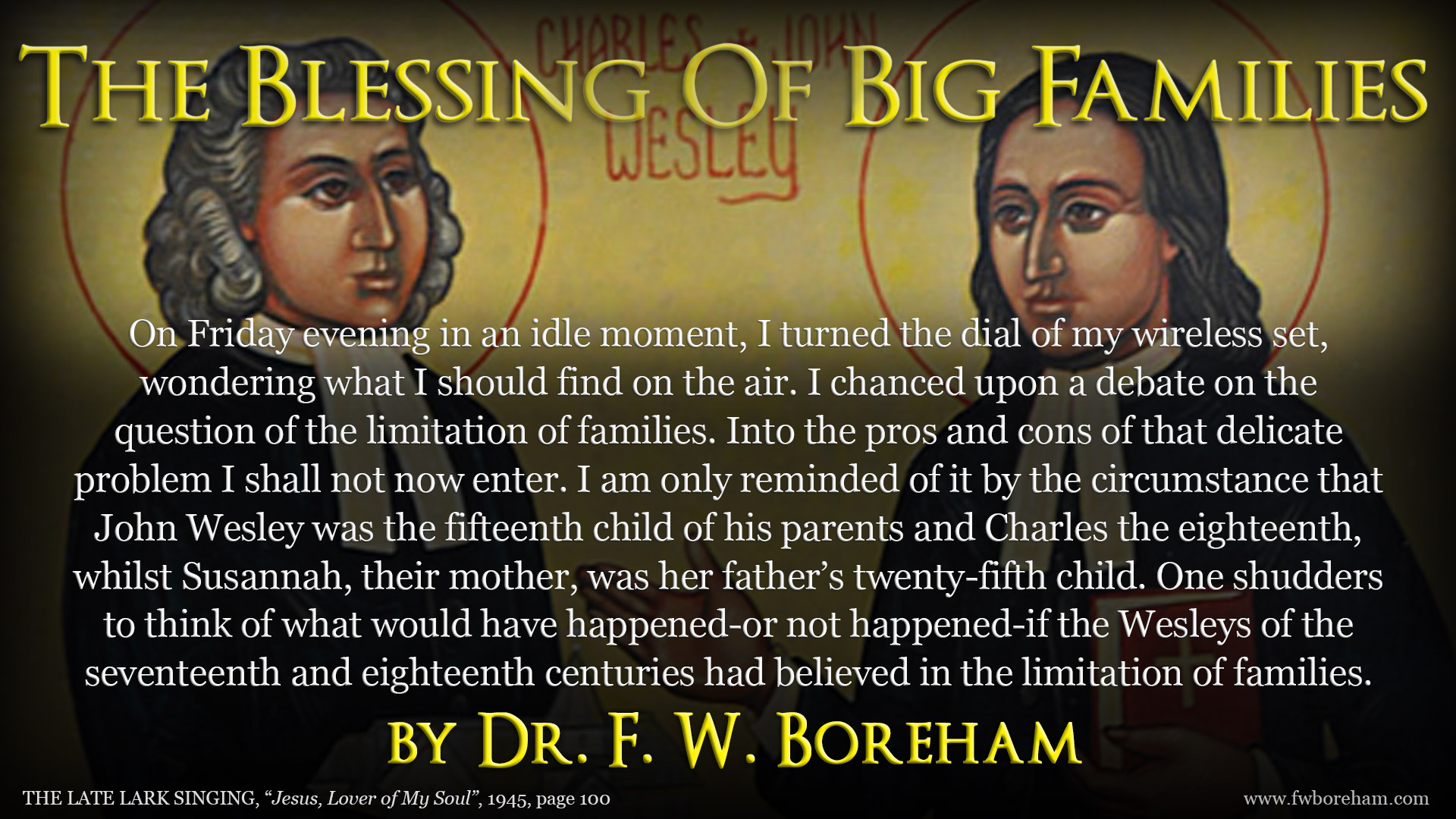





































































0 Comments